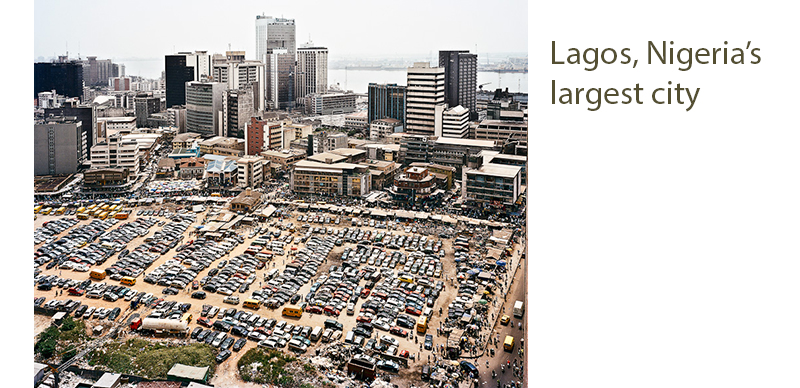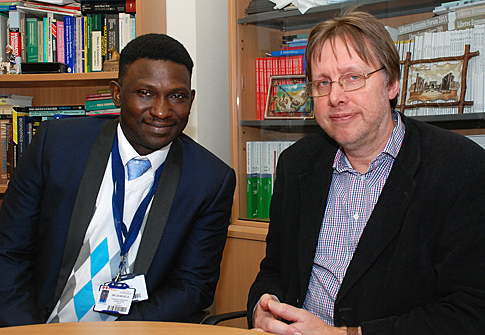PhD on the ‘pros and cons’ of trading in Africa’s largest economy

Tue, 01 Mar 2016 14:00:00 GMT
Nigerian James Mshelia looks at the risks and incentives for multi-nationals of trading with his home country
 ► Researcher James Mshelia with his supervisor Professor John Anchor
► Researcher James Mshelia with his supervisor Professor John Anchor
NIGERIA has many sources of instability, such as acute religious divisions, political instability, a tangled bureaucracy and a taxation system that can discriminate against overseas firms when they invest in the country. But with 174 million people, it is Africa’s most populous nation; it has the continent’s largest economy; and is the world’s seventh biggest oil producer.
This means that for many overseas firms, the attractions of investment in Nigeria outweigh the downsides. PhD researcher James Mshelia has researched the risks and the perceptions of risk that confront the multi-nationals.
It was during his service in the Nigerian Navy that James Mshelia developed a fascination for subjects such as operations and transport management. It led him to become a PhD researcher in the Business School at the University of Huddersfield, where he has now completed a thesis that investigates the risk and rewards for multi-national firms that invest in his home country.
“Nigeria is rated by credit agencies as a high political risk country, but investors are more concerned about their returns and can still operate at a profit even while having to deal with issues, such as corruption,” says James.
 He also analysed the different levels of political risk in different regions of Nigeria and this is among his most interesting findings, said James’s PhD supervisor John Anchor, who is Professor of International Strategy in the Business School.
He also analysed the different levels of political risk in different regions of Nigeria and this is among his most interesting findings, said James’s PhD supervisor John Anchor, who is Professor of International Strategy in the Business School.
“Nigeria is an attractive place for investment because of the population size and economic growth and the government has reined back its disincentives,” said Professor Anchor.
“Political and religious instability is the main disincentive for investment and, in some respects, it is a difficult country to operate in, but Nigeria has its attractions in others – for example a large percentage of the population speak English. The attractions outweigh the disincentives,” continued Professor Anchor, who added that James’s proposed research was very much in line with some of his own interests.
“I previously supervised a student doing a similar project in the Middle East, so I was interested to see how things might work out in Sub-Saharan Africa in terms of the political risk in the context of international business.”
Nigeria is the world’s seventh biggest oil producer
James’s research has already been the basis for presentations at two conferences and it is expected that his thesis will yield a sequence of academic articles. But his findings could have a wider impact.
 For example, he has drawn up a list of the “determinants” of political risk in a country, such as its bureaucracy, poverty rates, political structure, and its ethnic and religious divisions. These are factors that investors need to be aware of and they could also shape government policy.
For example, he has drawn up a list of the “determinants” of political risk in a country, such as its bureaucracy, poverty rates, political structure, and its ethnic and religious divisions. These are factors that investors need to be aware of and they could also shape government policy.
James is from a military background. He studied at the Nigerian Defence Academy and the University of Lagos for qualifications that included a Master’s in Transport Management. He served for 15 years in the country’s Navy – mainly as an instructor – and was in conflict zones, including Liberia and Sierra Leone, and there was a stint of counter-terrorism training in the USA.
He then decided to study for a doctorate overseas and was attracted by the University of Huddersfield’s mission statement, carried on its logo – Inspiring Tomorrow’s Professionals. Whilst at Huddersfield, he has also earned qualifications as a Postgraduate Certificate in Research and a Postgraduate Certificate in Education and has taken on some teaching and supervision himself.







